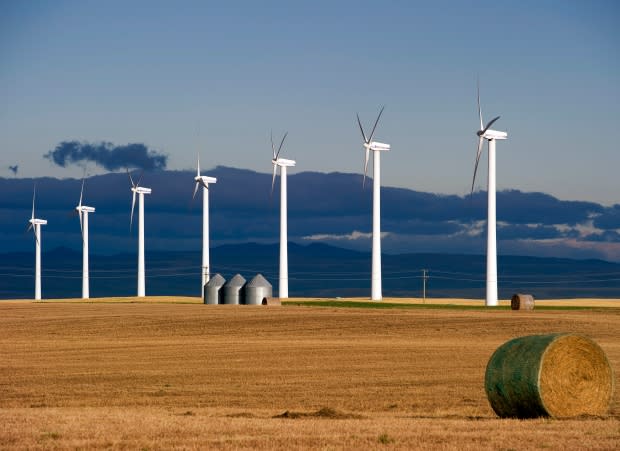Wind energy insiders optimistic UCP will support 'low-cost' renewable electricity
Wind energy specialists say they're hoping to find common ground with the United Conservative Party, despite the promises to step away from Alberta's current climate change plan.
Members of the Canadian Wind Energy Association are meeting in Banff, Alta., this week to talk about new technology and opportunities for the renewable energy.
The UCP's recent victory was top of mind for many.
"Every government, as you know, is looking for unique approaches to achieve some important objectives," association president Robert Hornung said Wednesday.
"We think that we will likely find common ground with the UCP in wanting to bring low-cost and clean, renewable electricity energy onto the grid.
"We look forward to working with them to try and make that happen."

He said he expects the cost of wind energy will decline as much as 50 per cent by 2040 as the technology to capture wind's power improves.
UCP Leader Jason Kenney said that his government would scrap the Alberta NDP's Climate Leadership Plan, which included a tax on carbon.
The party's platform says it considers financial support to develop renewable technology, or kickstart companies, to be "subsidies." Instead, the UCP's platform urges that industry to compete in the energy market unassisted.
A UCP government would stop funding renewable energy initiatives after Round 3 of the NDP's program that's already in effect.
The UCP's plan would see a smaller portion, than under the NDP, of the large emitter tax earmarked for clean technology development.
Large subsidies not needed, director says
Peter Tertzakian, executive director of Arc Energy Research Institute, noted that wind energy has proven to be a low-cost renewable — and he noted that UCP Leader Jason Kenney has committed to working with all forms of energy.
Renewable energy, Tertzakian said, is also an industry with jobs.
"The renewables business, led by wind, has demonstrated an ability to really reduce its costs, improve its utility," he said. "And so it's able to actually penetrate into the market without … a lot of subsidies and things.
"So I think the the impact of it is generally either neutral to positive."
Technological improvements have been a big driver of that affordability, Hornung said. Wind turbines have become taller, for instance, and better at capturing energy from the wind.
"Wind, like everything else, is benefiting from the I.T. revolution and the use of big data," he said. "Analytical tools is allowing us to capture that much more energy from the wind going forward."
Wind gets competitive
Alberta has seen some major developments in wind energy in recent years, including the development of four farms in the southern part of the province.
The province secured the lowest electricity price in Canada at the time, which experts said signaled wind had become competitive.
By 2030, the UCP said its efforts would result in an annual reduction of 43 megatonnes of carbon emissions without a carbon tax.
The NDP had promised that with its measures, the province would have been on track to see an annual 50-megatonne reduction by that time.
Human-produced carbon emissions are a leading contributor of climate change, which a recent federal report says will affect Canada at twice the global rate with devastating effects, such as increased risk of floods and fire.

